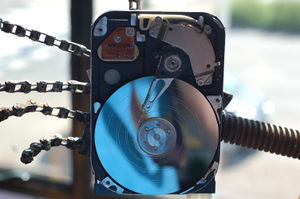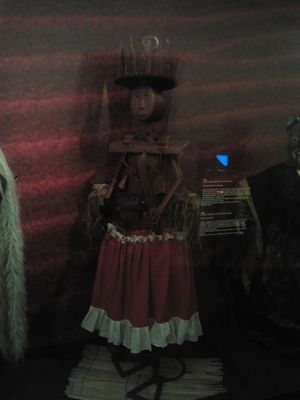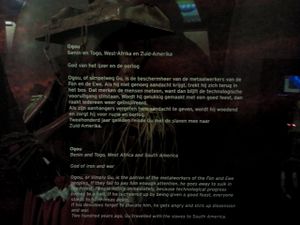God of Technology: Difference between revisions
No edit summary |
No edit summary |
||
| Line 16: | Line 16: | ||
Ok, so here we have a deity, that gets cheered up by having a party thrown in its name and accelerates technological progress in return. Interesting. So, lets examine those "parties" a little closer : | Ok, so here we have a deity, that gets cheered up by having a party thrown in its name and accelerates technological progress in return. Interesting. So, lets examine those "parties" a little closer : | ||
" His possessions can sometimes be violent. Those mounted by him are known to wash their hands in flaming rum without suffering from it later. They dress up in green and black, wave a sabre or machete, chew a cigar and demand rum in an old phrase "Gren mwe fret" (my testicles are cold). Often, this rum is first poured on the ground, then lit and, finally, the fumes generated by this are then allowed to pervade the peristyle. The sword, or much more commonly the machete, is his weapon and he often does strange feats of poking himself with it, or even sticking the handle in the ground, then mounting the blade without piercing his skin." <ref> Wikipedia http://en.wikipedia.org/wiki/Ogoun </ref> | " His possessions can sometimes be violent. Those mounted by him are known to wash their hands in flaming rum without suffering from it later. They dress up in green and black, wave a sabre or machete, chew a cigar and demand rum in an old phrase "Gren mwe fret" (my testicles are cold). Often, this rum is first poured on the ground, then lit and, finally, the fumes generated by this are then allowed to pervade the peristyle. The sword, or much more commonly the machete, is his weapon and he often does strange feats of poking himself with it, or even sticking the handle in the ground, then mounting the blade without piercing his skin." <ref>Wikipedia http://en.wikipedia.org/wiki/Ogoun</ref> | ||
As an former engineering student, a scientist and as a hacker, I could instantly relate to the notion presented above. Especially the part where regularly partying with rum and cigars pleases the god of technology, who will reward you for it with new ideas. What's not to like? | As an former engineering student, a scientist and as a hacker, I could instantly relate to the notion presented above. Especially the part where regularly partying with rum and cigars pleases the god of technology, who will reward you for it with new ideas. What's not to like? | ||
| Line 60: | Line 60: | ||
== References == | == References == | ||
<ref> He is not really a god, but rather an orisha and loa. [http://en.wikipedia.org/wiki/Ogoun Orisha] is a spirit or deity that reflects one of the manifestations of Olodumare (God) in the Yoruba. Orisha is an "intermediary between man and the supernatural. The [http://en.wikipedia.org/wiki/Loa Loa], likewise are see to bee the spirits of Haitian Vodou. They are also referred to as Mystères and the Invisibles, in which are intermediaries between Bondye (Bon Dieu, or good god)—the Creator, who is distant from the world—and humanity. Unlike saints or angels however, they are not simply prayed to, they are served. They are each distinct beings with their own personal likes and dislikes, distinct sacred rhythms, songs, dances, ritual symbols, and special modes of service. Contrary to popular belief, the loa are not deities in and of themselves; they are intermediaries for a distant Bondye. The term is often translated as "deities" or "divinities"</ref> | |||
<references /> | |||
Revision as of 18:48, 4 June 2012
| Project God of Technology | |
|---|---|
| Status | In progress |
| Contact | User:Gori |
| Last Update | 2012-06-04 |
I was inspired to build a sculpture based on this sculpture I saw in Museon in The Hague.
It is a sculpture of the Yoruba "god" Ougun who presides over iron, hunting, politics and war.
The sign at the museum said :Ogou, (Benin and Togo, West Africa and SOuth America. God of iron and war Ogou, or simply Gu, is the patron of the metalworkers of the Fon and Ewe peoples. If they fail to pay him enough attention, he goes away and sulks in the forest. People notice immediately, because technological progress comes to a halt. If he is cheered up by being given a good feast, everyone start to have ideas again. If his devotees forget to placate him, he gets angry and stirs up dissension and war.
Ok, so here we have a deity, that gets cheered up by having a party thrown in its name and accelerates technological progress in return. Interesting. So, lets examine those "parties" a little closer :
" His possessions can sometimes be violent. Those mounted by him are known to wash their hands in flaming rum without suffering from it later. They dress up in green and black, wave a sabre or machete, chew a cigar and demand rum in an old phrase "Gren mwe fret" (my testicles are cold). Often, this rum is first poured on the ground, then lit and, finally, the fumes generated by this are then allowed to pervade the peristyle. The sword, or much more commonly the machete, is his weapon and he often does strange feats of poking himself with it, or even sticking the handle in the ground, then mounting the blade without piercing his skin." <ref>Wikipedia http://en.wikipedia.org/wiki/Ogoun</ref>
As an former engineering student, a scientist and as a hacker, I could instantly relate to the notion presented above. Especially the part where regularly partying with rum and cigars pleases the god of technology, who will reward you for it with new ideas. What's not to like?
So, by colleboaratively collecting, cutting, welding, soldering, installing and rebooting a pile of metal and computer waste, we have him. Our god of technology. This process of extreme casemodig has lead to a the sculpture referred to by Revspacers as the "robot". The "robot" is a fully functional linux PC. Many people contributed physical labor and ideas to the sculpture. Thanks! You too are welcome to physicaly/software hack it.
PC details
- Username: root/gori
- Password: geheim
Specs: <soon>
References
<ref> He is not really a god, but rather an orisha and loa. Orisha is a spirit or deity that reflects one of the manifestations of Olodumare (God) in the Yoruba. Orisha is an "intermediary between man and the supernatural. The Loa, likewise are see to bee the spirits of Haitian Vodou. They are also referred to as Mystères and the Invisibles, in which are intermediaries between Bondye (Bon Dieu, or good god)—the Creator, who is distant from the world—and humanity. Unlike saints or angels however, they are not simply prayed to, they are served. They are each distinct beings with their own personal likes and dislikes, distinct sacred rhythms, songs, dances, ritual symbols, and special modes of service. Contrary to popular belief, the loa are not deities in and of themselves; they are intermediaries for a distant Bondye. The term is often translated as "deities" or "divinities"</ref>
<references />
























